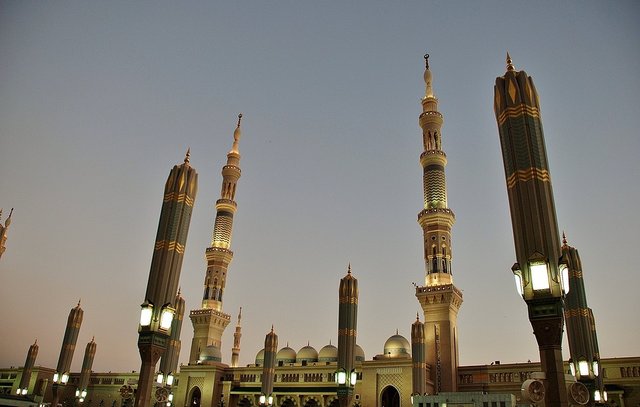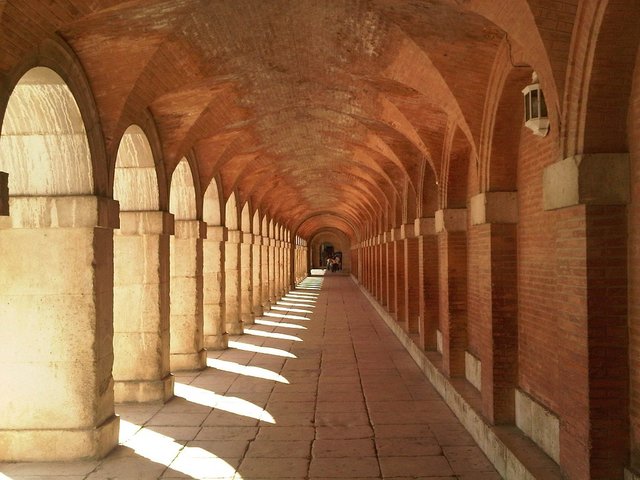
Muhammad is the prophet of the Muslims. Concerning his life, historical sources are rare and exclusively Muslim.
Moreover, we must take them with caution, because there can be a certain ambiguity between the historical figure (Muhammad ibn Abdallah) and the mythified one.
Types of sources
1. The Qur'an, (however, it contains little information on its biography).
2. The Sunna or tradition, -> Hadiths (words and deeds of Muhammad, recorded about two centuries after his death, subject to precaution because transmitted orally by the chain of transmitters -> Isnad).
3. The Sira (his biography written in the ninth century).
The beginning
According to these sources, he was born in 570 AD, in the Quraysh tribe. The tribes are composed of several clans, and Muhammad belongs to the Hashemite clan.
The powerful Quraysh tribe had the task of guarding the temple of the Ka'ba (the latter had more than 360 idols). At that time, in the Arabian Peninsula, there was a type of belief called henotheism. It's the idea that there is a single supreme God and the possibility of secondary divinities. Moreover, in this geographical area, we could also find animist, Christian and Jewish beliefs.
Muhammad became an orphan from the age of six. Very young, he will work at the service of a rich owner of caravans, Khadija.
At the age of 25, he will marry this rich widow. He had several children with her, but only his daughter (Fatima) survived. Khadija will then become an important female figure for Islam.
"The birth of Islam is first and foremost the story of a woman, Khadija. The first wife of the
prophet, the one who loved her when he was only a young caravaner, the one who, before all, said to him :
"Me, I believe." » A

The revelation
Muhammad often took the time of a spiritual retreat alone, in a cave of mount Hira.
And about the year 610, at the age of 40, he heard a voice during his sleep. According to tradition, it was the voice of the angel Gabriel instructing him to read ("Read", "Ikra" in Arabic).
"Read, in the name of your lord who created, who created man from a clot of blood. Read ! Your Lord is the most noble, he taught by the pen (the Kalam), taught man that which he knew not."(Sura 96, verses 1-5)
Upon awakening, he heard a voice calling him a messenger of Allah. He ran to his wife Khadija, who brought him to see Waraqa ibn Nawfal (a converted Christian, knowing the Bible). The latter told him that the message he had received was divine.
From then, Muhammad was the prophet of Allah and he converted his wife, Abu bkr (his friend), Ali (his cousin) and a handful of men.
According to the Qur'an, Muhammad would have adopted hanifism (belief in a Supreme Lord), but over the years this supreme Lord (hanif) has passed to a single God.
"Say: '' It is Allah, the one, Allah, the only one to be implored for what
we wish. He never begotten, nor was begotten either. And no one is equal to him."(Sura 112, verses 1-4)
He then presented himself as the prophet of Allah, explaining new rituals to the pagans. For example, the recitation of the words of Allah, as well as proskynesis (prostration which seems to be borrowed by the Hanifs from the Christians of the sixth century).
Little by little, Muhammad began to denounce the polytheism of the Meccans. And the Hijra period came.

The Hijra
The words of Muhammad was not welcomed by the Meccans, and they began to reject his followers. Moreover, when he lost his two protectors, Khadija and his uncle Abu Talib. The situation became unmanageable and he had only one solution left, fleeing Mecca.
According to tradition in 622, he undertook to settle in Yathrib (later becoming Medina), with his faithful friend Abu Bkr and some converted people. This year 622 of the Hijra, is the beginning of the Muslim calendar.
From then, in addition to his status as religious leader, he also became political leader with arbitration obligations for the conflicts that the community (Ummah) of Medina could meet.
Moreover, Muhammad proclaimed himself the last of the prophets and believed that Christians and Jews had betrayed the monotheism of Abraham.
"Abraham was neither a Jew nor a Christian, but a ''Muslim'' Hanif and he was not among the associators "(Sura 3, Verses 65-68)
There was a jewish community in Medina, who refused to recognize Muhammad as a prophet. And from 624 to 627, numerous altercations and exactions against the three main jewish tribes settled in Medina, pushed these latter to flee. Some Jews were even slaughtered and others sold as slaves.
"Allah sets aside the unbelievers with all their rancor and spares the fighting to the believers. Allah is strong and powerful. And the holders of scripture who supported (the unbelievers), he sent them down from their fortresses and threw terror into them heart; Some of you killed them, others you made them prisoners. To you, he gave their land as an inheritance, as well as their homes and property and (other) lands that you had not yet trampled on your feet. Allah has power over everything.(Sura 33, verses 25-27)
Defensive phase
During the same period, a commercial blockade was put in place by the Quraysh tribe over the city of Medina. To survive, the Meccan exiles (Muhadjirun) and the Medes (Ansar) allied themselves to raid on the caravans of Mecca.
The Quraysh did not wait to retaliate, and attacked the Muslims. The latter suffered a heavy defeat in 625, not far from Mount Uhud.
Two years later, the Quraysh assembled an army and undertook an attack on Medina. The defenses set up by Muhammad (including a ditch around the city) prevented the opposing army from penetrating into the city. And finally they stopped the siege of the city. This episode is now known as the "battle of the ditch" (al-handaq). Muhammad then became in addition to these previous functions (religious and political), a warrior leader.
Offensive phase
More and more tribes rallied to Muhammad. In 628, he undertook a pilgrimage to Mecca. However, the Quraysh did not allow him to do so, he nevertheless obtained permission to come on the pilgrimage the following year (for three days).
In 630, Muhammad broke the pact of Hudaybiya, pretexting the murder of a Muslim. He then undertook a march on Mecca with an army of more than 10,000 men. He entered the city and brought down all the idols and said "No blame will there be upon you today. Allah will forgive you; and He is the most merciful of the merciful."(Sura 12, verses 92) and that Allah declared that the Mecca is a sacred territory.
However, this great victory did not yet seal the authority of the prophet over all the tribes of Arabia. Indeed, the Hawazin tribe (enemies of the Quraysh tribe) undertook a march on Mecca.
Still in 630, the Muslims fought the Hawazin at Hunayn. The victory of the Muslims pushed the last recalcitrant tribes to submit to Muhammad.

The end of his life
In 632, the prophet of the Muslims Muhammad, undertook his last pilgrimage to Mecca, known as "Farewell pilgrimage". Due to the fact he fell ill in the weeks that followed and died in that year.
"Today I have completed for you your religion, and accomplished on you my benefit. And I accept Islam as a religion for you. "(Sura 5, verse 3)
We can thus see that there have been several phases over several years in the "Qur'anic revelation," and that certain verses of the Qur'an, as well as the Hadiths, have to be interpreted according to their contexts. Otherwise, the interpretation of these verses without contextualization can be dangerous, and unfortunately can often lead to unspeakable drifts. I hope that has been helpful to you. A word to the wise.
*
Image sources : 1, 2, 3, 4
Information sources :
A : Marek Halter, Khadija les femmes de l’Islam, Roman Robert Laffont, 2014
Ibn Hicham, L’élagage de la Biographie du Prophète, traduit de l’arabe par Mohammad Al-
Hamoui, Ed.Dar al-kotob Al-Ilmiyah, Liban, 2000
Sénac P., Le monde musulman, des origines au début du XIe siècle, Ed. Armand Colin, 2007
Nagel T., Mahomet, Histoire d’un Arabe, invention d’un Prophète, traduction de Jean-Marc
Tétaz, Ed. Labor et Fides, 2012
Good to you,
@lastminuteman




Nice work! Shame it didn't get more views!
Very nice - lots of work - thank you. Upvoted.
Thank you very much, indeed it takes me several hours translating, etc.. But I guess It's worth it, especially if the information is useful for someone ;)
Great information! Upvoted ;)
Thanks, glad you liked it =)
Interesting post. Following and upvoted. :)
This post has been ranked within the top 50 most undervalued posts in the first half of Feb 07. We estimate that this post is undervalued by $5.86 as compared to a scenario in which every voter had an equal say.
See the full rankings and details in The Daily Tribune: Feb 07 - Part I. You can also read about some of our methodology, data analysis and technical details in our initial post.
If you are the author and would prefer not to receive these comments, simply reply "Stop" to this comment.
Thanks for the information ;)